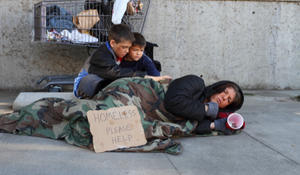In 1998, a consortium of child welfare agencies in Missouri were researching the market for web based, social services case management software. When their search turned up empty...they hired a firm to create it for them. A few months later in the spring of 1998, FAMCare was born.
GVT Admin
Recent Posts
Social Services Software for Child and Family Welfare Agencies
Topics: FAMCare, social services software, Family and Child Welfare
NGOs and Covid-19: How Are Organizations Adapting to The Pandemic?
COVID-19 has drastically changed the whole world. From food shortages to problems in the healthcare sector, we’ve seen a wide range of problems since the start of the pandemic in 2020. In these challenging circumstances, NGOs play a vital role in helping individuals get their lives back on track.
Here's a few examples of how NGO's are adapting in an ever-changing pandemic era. They are finding different ways to rise to the needs and demands placed on them during these turbulent times.
A case worker who has worked her entire career feeding the hungry in America recently told us:
"When I was a girl and hesitated to eat my spinach, my eagled-eyed mother would notice and say, ' What about all the starving children in China? Think of them and be grateful you have enough to eat. Finish your spinach.' Like so many other middle-class Americans, I believed hungry children lived in China, India, or Africa, not in America. I believed that until I went into social work at the largest food bank in Pennsylvania. That opened my eyes.
Topics: Homeless & Food Pantry, social issues
How Non-Profits Are Modernizing Their Technology in 2022
Non-profits have ambitious goals, but they are often buried under a workload of paper. According to an estimate, only 11% of non-profit organizations pay attention to including technology in their operations. Doing things manually takes a lot of time and manpower, so understanding the value of technology is critical for non-profits.
When agencies dig in and start looking into the advances and potential benefits that modernizing technology can bring to the table, here’s some of the things they consider.
Topics: Nonprofit General, case management software, nonprofit software solutions
BENEVOLENT AGEISM...They Treat Me Like I’m Old and Stupid
The COVID-19 pandemic has caused social workers to take a closer look at their ingrained prejudices when dealing with the aged. Robert N. Butler coined the term “ageism" in 1969 to describe attitudes, practices, and policies that discriminate against older people. Ageism occurs when people face stereotypes, prejudice, or discrimination because of their age. The assumption that all older people are frail and helpless is a common, incorrect stereotype. Prejudice can consist of feelings such as “older people are unpleasant and difficult to deal with.” Discrimination is evident when older adults’ needs aren’t recognized and respected or when they’re treated less favorably than younger people. Social workers who work with the elderly are realizing that even in their minds age is “a category of difference” like race and gender, but unlike race and gender, age positions older adults as a homogenous group with similar needs.
Topics: Elderly/Aging Long Term Care, social issues, Covid-19/Pandemic
In Their Own Words Social Workers Reflect on the Pandemic's Fatal Blow
(Excerpted from an article by Paul Moakley in Time Magazine, "Deaths Amoung America's Homeless Are Soaring in the Pandemic. A Photographer Captures a Community In Crisis")
Topics: Homeless & Food Pantry, mental health, social issues, Covid-19/Pandemic
Must-Have Traits to Adopt to Become a Successful Caseworker
Casework can be very demanding at times. It’s also a broad profession in terms of the situations and expectations that social workers come across.
Despite it being a challenging field, it’s also one of the fasting growing ones here in the US. This is mainly due to the high demand for caseworkers globally to counter a growing shortage, especially here in the US.
And while social services case management software can help manage the caseload to a certain extent, caseworkers need certain traits also.
Topics: Technology Speak, caseworkers, social workers, what social workers do
Football fans see this message on the back of the Buffalo Bills' helmets
"On Saturday, January 15th, a gunman entered Congregation Beth Israel in Colleyville, TX, and held hostages for much of the day. We are grateful that all four hostages made it out safely, and thankful for law enforcement, first responders, and the security training that our partner Secure Community Network provided to this community. The horrifying attack on the Colleyville synagogue was a continuation of a troubling and unacceptable trend of attacks on Jewish houses of worship and individuals who are visibly Jewish." (The Jewish Federations of North America)
Topics: social justice
3 of the Best Tips and Practices to Keep Nonprofit Data Secure
Keeping data secure is a top priority for non-profits and there are several reasons for this.
Non-profits are usually associated with various donors, and the relationship a non-profit has with them is a sensitive one. Protecting their personal information therefore is a priority for any organization.
Additionally, and most important, many non-profits in the human services field handle adults and juveniles in very vulnerable situations. Therefore, their personal information getting compromised or stolen is simply not acceptable. A breach of data would directly contradict the primary purpose of the non-profit, which is to protect the vulnerable.
Here are a few simple ways non-profits can secure their data.
Topics: Secure Case Management, nonprofit software solutions, HIPAA Compliant
Can Digital Case Management Systems Help Nonprofits Improve Efficiency?
Nonprofit organizations are often chaotic spaces with a plethora of operations and programs underway. There are huge caseloads to deal with, events to organize, and heaps of paperwork to get through. These are just typical days and yes, sometimes, it gets worse.
Topics: case management software, nonprofit software solutions










